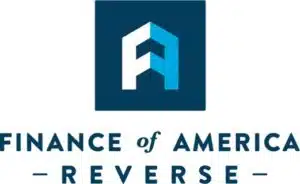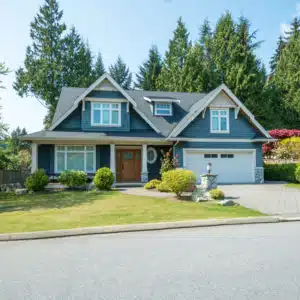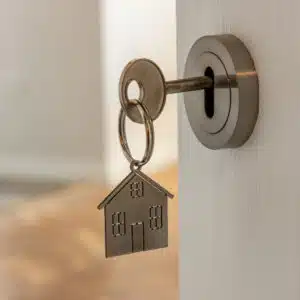If I were getting a reverse mortgage this month, Finance of America Reverse would make my shortlist.
Like other lenders, Finance of America Reverse sells FHA-insured reverse mortgages. But the lender specializes in another kind of reverse mortgage: proprietary loans that tap into even more of your equity.
Let’s take a closer look at this company and its reverse mortgage products.
Table of Contents
- Who Owns Finance of America Reverse LLC?
- What Sets Finance of America Reverse Apart From Other Reverse Mortgage Brokers?
- Finance of America Reverse Mortgage Products
- How Much Does A Finance of America Reverse Mortgage Cost?
- Customer Experience
- Finance of America Reverse Is a Solid Choice
- The Bottom Line – Finance of America Reverse Review
Who Owns Finance of America Reverse LLC?

The Blackstone Group owns Finance of America, which offers reverse mortgages through a subsidiary named Finance of America Reverse LLC, or FAR. Based in Oklahoma, Finance of America Reverse has brokers in most states and in Puerto Rico.
Shoppers in the Dakotas, Montana, Hawaii, Arkansas, Nebraska, and the northern reaches of New England may have trouble finding a broker. Almost everyone else in the nation can find a broker and speak with a Finance of America Reverse (FAR) advisor in their town or within a reasonable drive.
I point this out because FAR prioritizes making personal connections with potential customers. As a result, you’ll have a much easier time making an appointment over the phone than applying online.
What Sets Finance of America Reverse Apart From Other Reverse Mortgage Brokers?
The growing number of reverse mortgage firms — combined with the federal government’s regulations capping fees and influencing interest rates — has made it harder for reverse mortgage brokers to distinguish themselves in the market.
FAR is unique because of its wide variety of proprietary loans. FAR markets these products, also called jumbo reverse mortgages, under the brand name HomeSafe®. FAR’s HomeSafe® loans can free up significantly more of your equity than an FHA-Insured backed HECM loan, which tops out at $4 million as of 2023.
Since proprietary loans do not follow this FHA regulation, borrowers who have high-value homes can access up to $4 million in equity with a HomeSafe® reverse mortgage.
Finance of America Reverse Mortgage Products
Finance of America Reverse offers two unique reverse mortgage products: their proprietary HomeSafe® reverse mortgage options and an FHA-Insured Home Equity Conversion Mortgage.
HomeSafe® Reverse Mortgages
Many lenders offer a proprietary reverse mortgage option. FAR stands out because it allows a lot of choice and flexibility within its HomeSafe® line of products:
- HomeSafe® Standard: Trades your equity for a single, lump-sum payment.
- HomeSafe® For Purchase: Coverts your equity into cash to use if you’re buying another property.
- HomeSafe® Select: An adjustable-rate option that could help shorter-term borrowers save on interest charges while still maximizing the loan; available in 11 states.
No other lender presents this much variety in its proprietary reverse mortgage loans. But keep in mind: Not every option will be available in every state. FAR is working to increase these loans’ availability.
HECM Loans
I’ve talked a lot about proprietary loans because FAR excels with these. Most customers, however, still want a FHA-Insured Home Equity Conversion Mortgage (HECM). Finance of America Reverse does well with standard HECMs, too.
Like AAG, FAR can pay your loan as a lump sum, as term payments each month, or as a line of credit. You could get a fixed-rate or an adjustable-rate mortgage. An ARM may make sense if you plan to keep the loan for only a couple of years.
FAR requires most customers to go through a brief counseling session to make sure customers understand the debt they’re taking on.
What Is The Borrowing Limit On A HECM?
The FHA recently increased the borrowing limit on HECMs to $1,149,825 — still plenty of money for most customers.
As with FAR’s HomeSafe® loans, you’ll have more success calling customer service than trying to shop online with FAR’s HECM loans.
And, you’ll see some additional fees with HECMs, such as federal mortgage insurance premiums, which shouldn’t exceed 2 percent of your loan the first year and 0.5 percent of your balance the following years.
How Much Does A Finance of America Reverse Mortgage Cost?
Loan costs vary depending on whether you’re getting a HomeSafe® proprietary loan or a standard HECM through the Federal Housing Authority.
- Mortgage Insurance: HECM loans require you to pay annual mortgage insurance premiums of 2 percent of your loan’s balance the first year, followed by 0.5 percent a year each subsequent year. HomeSafe® loans do not require this insurance.
- Appraisal: Before borrowing against your equity, your lender will want to know exactly how much equity you have. To find out, you’ll need an appraisal, which can cost $200 to $600. Both HECM and HomeSafe® loans require an appraisal, and you’ll need to pay this cost out of pocket.
- Closing Costs: If you’re using your reverse mortgage to buy another property, expect to pay closing costs on the new property. Even a standard reverse mortgage will incur some closing costs, which can be folded into the loan.
- Origination Fees: Loan origination fees may be the biggest expenses you’ll face with a reverse mortgage. HECM loans’ origination fees will range from $2,500 to $6,000, depending on your loan amount. HomeSafe® loans could cost up to $8,000 to originate. Many borrowers pay this fee with proceeds from the loan.
- Interest Charges: You won’t be making payments on a reverse mortgage, so the interest charges will continue to build throughout the life of the loan. Reverse mortgage rates tend to mirror conventional mortgage rates.
Because many costs can be absorbed into your new debt, a reverse mortgage can seem like a great deal. “The bank pays you,” is a common selling point.
Eventually, you (or your heirs after you die) will feel the costs. The loan — including all the costs built into it — will have to be paid off if you stop using the home as your primary residence if you sell the home, or after you pass away.
Comparing Costs: HECM vs. HomeSafe® Reverse Mortgages
| Cost Component | HECM Loan | HomeSafe® Loan |
|---|---|---|
| Mortgage Insurance | 2% 1st Year, 0.5% Annually Thereafter | Not Required |
| Appraisal | $200 – $600 (Out of Pocket) | $200 – $600 (Out of Pocket) |
| Closing Costs | Incurred When Buying a Property | Some Costs Can Be Rolled Into the Loan |
| Origination Fees | $2,500 – $6,000 (Varies by Loan Amount) | Up to $8,000 |
| Interest Charges | Accumulates Over the Loan Term | Accumulates Over the Loan Term |
| Long-term Costs | Repaid if Property Use Changes, Sold, or After the Borrower’s Passing | Repaid Under Similar Conditions |
Customer Experience
FAR maintains an up-to-date website with FAQs, loan details, and even a feature designed to direct you to the loan most likely to meet your specific needs.
When you want to apply for a loan, however, FAR’s online tools will seem lacking. In fact, you’ll be directed to a phone number or the physical address of the company advisor nearest you.
FAR doesn’t encourage online applications for a couple of reasons:
- Customer Age: You must be 60 or older to be eligible for a reverse mortgage. Yes, many 62+-year-olds live and work online just like us GenXers and millennials. But older shoppers more often appreciate a personal connection. There are some age exceptions in the states of Texas and Utah.
- A Personal Approach: Even as it has grown into the second biggest reverse mortgage provider, FAR still prefers to interact with its customers on a one-on-one basis. This works better in a physical office or over the phone.
If you have a strong preference for interacting with your lender online, FAR may not be your best option.
Finance of America Reverse Is a Solid Choice
Reverse mortgages are expensive, and they can be misleading. As you compare loans, make sure you’re aware of all the costs. Consider discussing options with your adult children or other heirs since your loan could affect them after you die.
As you compare options, you’ll likely notice that Finance of America Reverse offers some of the best reverse mortgage options in the marketplace.
FAR excels with customer service because it prefers a personalized approach to your loan. This doesn’t mean you can’t have customer service issues; it just means FAR is likely to work toward a resolution.
The Bottom Line – Finance of America Reverse Review
In considering reverse mortgages, Finance of America Reverse (FAR) emerges as a standout contender, particularly for its proprietary HomeSafe® reverse mortgage options.
With offerings that surpass the average in terms of flexibility and variety, FAR has positioned itself as a market leader. While their personalized touch is commendable, it’s worth noting that their approach might not align with the preferences of those inclined toward online transactions.
Nonetheless, their dedication to ensuring customers fully comprehend their financial commitments, combined with their drive for customer satisfaction, makes FAR a commendable option for those in the market for a reverse mortgage.
How We Review Mortgage Lenders:
Good Financial Cents evaluates U.S. mortgage lenders with a focus on loan offerings, customer service, and overall trustworthiness. We strive to provide a balanced and detailed perspective for potential borrowers. We prioritize editorial transparency in all our reviews.
By obtaining data directly from lenders and carefully reviewing loan terms and conditions, we ensure a comprehensive assessment. Our research, combined with real-world feedback, shapes our evaluation process. Lenders are then rated on various factors, culminating in a star rating from one to five.
For a deeper understanding of the criteria we use to rate mortgage lenders and our evaluation approach, please refer to our editorial guidelines and full disclaimer.
Finance of America Reverse Review

Product Name: Finance of America Reverse
Product Description: Finance of America Reverse (FAR) is a leading reverse mortgage lender that offers a range of products, including the proprietary HomeSafe® reverse mortgages. The company, a subsidiary of The Blackstone Group, emphasizes personalized customer service, targeting homeowners looking for equity solutions.
Summary
Finance of America Reverse (FAR) stands out in the crowded reverse mortgage market with its unique offerings, especially the HomeSafe® line of products. These proprietary loans enable homeowners with high-value properties to tap into significant equity beyond what traditional FHA-backed HECMs allow. Based in Oklahoma, FAR has a presence in most states and Puerto Rico. The company prioritizes face-to-face interactions and personal connections, ensuring that customers are well informed and comfortable throughout the reverse mortgage process.
-
Cost and Fees
-
Customer Service
-
User Experience
-
Product Offerings
Overall
Pros
- Diverse Product Range: FAR’s HomeSafe® product line is comprehensive, providing options like the HomeSafe® Standard, HomeSafe® For Purchase, and HomeSafe® Select, catering to various homeowner needs.
- Personalized Approach: FAR places a premium on personal connections, ensuring customers can meet brokers in person or over the phone for a comprehensive understanding of products.
- Experienced Backing: As a subsidiary of The Blackstone Group, FAR comes with strong financial backing and industry experience.
- Extensive Geographic Presence: With brokers in most states and Puerto Rico, FAR has an expansive reach, making it accessible to a vast majority of homeowners.
Cons
- Limited Online Interactions: Those who prefer online transactions might find FAR’s emphasis on in-person or telephonic interactions less convenient.
- Not Nationwide: Homeowners in certain areas, like the Dakotas, Montana, and northern New England, may have challenges finding a local broker.
- Potentially High Costs: While reverse mortgages can be beneficial, they can also come with high origination fees and other costs that borrowers should be aware of.
- Requirement for Counseling: Some customers might find the mandatory counseling session to be an additional, albeit necessary, step in the process.







